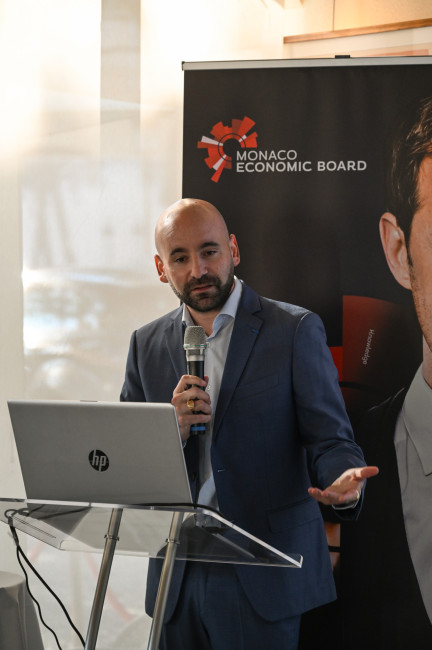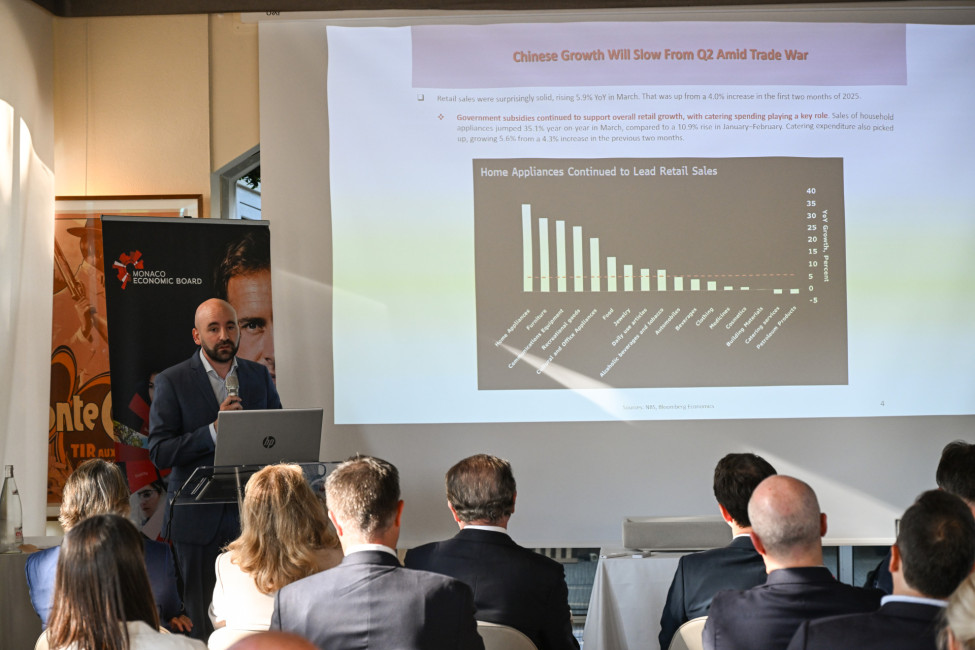Christophe Barraud evaluates the macroeconomic landscape across his three fields of expertise.
On 15th May, the Monaco Economic Board (MEB) partnered with Monterra Wealth Management to host economist Christophe Barraud, Chief Economist and Strategist at Market Securities. Regularly recognised as the best forecaster by Bloomberg for China, the U.S., and the Eurozone, he provided a brilliant analysis of what he called an "extremely turbulent and volatile" situation.
At Castelroc restaurant, overlooking the Prince's Palace, MEB leaders Michel Dotta and Guillaume Rose, joined by Xavier Midorge from event sponsor Monterra Wealth Management, hosted over 80 business leaders at the conference.
"I did mention that Donald Trump would be elected, so that's something at least!" To say the least, this is a challenging time for economic forecasters. Despite his skills and many accolades, Christophe Barraud acknowledges that forecasting is especially perilous during this period. Still, he provided a presentation filled with insights due to his deep understanding of his three areas of expertise: China, the United States, and the Eurozone.
In China, "the first quarter of 2025 was rather good, with annual growth similar to the fourth quarter, at 5.4%". The economist notes that strong consumption suggests government efforts to boost consumption, promote tourism, and develop infrastructure are starting to yield results amidst export challenges due to US tensions. Another step is "a sectoral rebalancing from industry towards high value-added sectors, which is accelerating" (electric vehicles, drones, etc.). Additionally, real estate, "one of the main drags on the economy for nearly five years, is beginning to show positive signals". This contributes to Christophe Barraud's more optimistic growth forecast of +5.4% in 2025 for China. This is further bolstered by a recent agreement between the world's leading powers, potentially averting a US recession.
In the first quarter, the United States experienced a 0.3% contraction in GDP, attributed to impending tariffs linked to "stratospheric imports. " Nevertheless, if we examine the growth core, encompassing consumption and investments, we see a growth rate of 2.6%, "which is relatively satisfactory despite all the uncertainty we faced in this first quarter. " While Donald Trump is poised to engage in negotiations, the economist warns that "new announcements of sectoral tariffs are expected, and it will remain volatile." Furthermore, with his approval ratings declining, the President is likely to moderate his stance and propose tax reductions aimed at stimulating consumption, which could be jeopardised by a resurgence of inflation.
Christophe Barraud identifies two reasons the Eurozone will avoid collapse amid uncertainty and tariffs. First, "a much more accommodating monetary policy" with lower interest rates promotes private credit and growth. More importantly, funds for defence, "we're talking about 800,000 billion euros over the next four years," will bolster activity. Germany's plan for 500,000 billion euros in infrastructure investments over 12 years also contributes. "In terms of impact and stimulus (...), what has been done is considerable for a country that had a dogma on debt and where spending was not desired. " Despite a challenging 2025, Barraud predicts a significant economic rebound in 2026. He remains pessimistic about France due to rising debt, lamenting the trend "to increase taxes rather than reduce unnecessary spending. "
Christophe Barraud's presentation was exceptionally informative, featuring a wealth of concrete examples. It concluded with a Q&A session that extended to the terrace of Castelroc, which offered a beautiful view of the sea—an ideal setting to reimagine the world!



